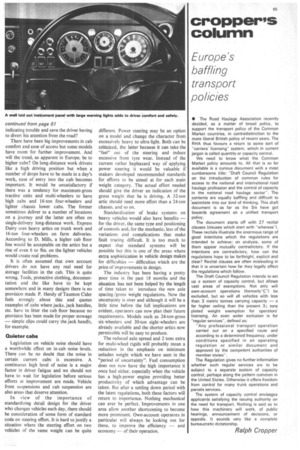cropper's column
Page 67

If you've noticed an error in this article please click here to report it so we can fix it.
Europe's baffling transport policies
• The Road Haulage Association recently decided, as a matter of broad policy, to support the transport policy of the Common Market countries, in contradistinction to the more liberal British policy of recent years. The RHA thus favours a return to some sort of 'carriers' licensingsystem, which in current jargon is called quantity or capacity control.
We need to know what the Common Market policy amounts to. All that is so far available is a curious document with a most cumbersome title: "Draft Council Regulation on the introduction of common rules for access to the national and international road haulage profession and the control of capacity in the national road haulage sector". The contents are equally baffling and difficult to 'assimilate into our kind of thinking. This draft document is as far as the Six have got towards agreement on a unified transport policy.
The document starts off with 27 recital clauses (clauses which start with "whereas"). These recitals illustrate the enormous range of good intentions which the regulations are intended to achieve; on analysis, some of them appear mutually contradictory. If the intentions are contradictory, how can the regulations hope to be forthright, explicit and clear? Recital clauses are often misleading in that it is uncertain how far they legally affect the regulations which follow.
The Draft Council Regulation intends to set up a system of capacity control, but allows vast areas of exemptions. Not only will own-account operations (formerly-C") be excluded, but so will all vehicles with less than 3 metric tonnes carrying capacity — a far higher ceiling than the present 3 tons plated weight exemption for operators' licensing. An even wider exclusion is for "regular services", defined as:
"Any professional transport operation carried out on a specified route and according to a determined frequency, under conditions specified in an operating regulation or similar document and approved by the competent authorities of member states".
The Regulation gives no further information whether such regular services are to be subject to a separate system of capacity control, perhaps along the pattern common in the United States. Otherwise it offers freedom from control for many trunk operations and parcels services.
The system of capacity control envisages applicants satisfying the issuing authority on the need for transport. Nothing is said as to how this machinery will work, of public hearings, announcement of decisions, or appeals. It sounds very like a. complete bureaucratic dictatorship.
Ralph Cropper
















































































































































